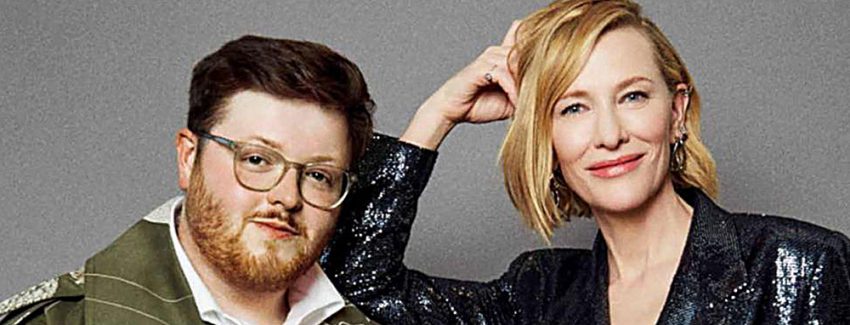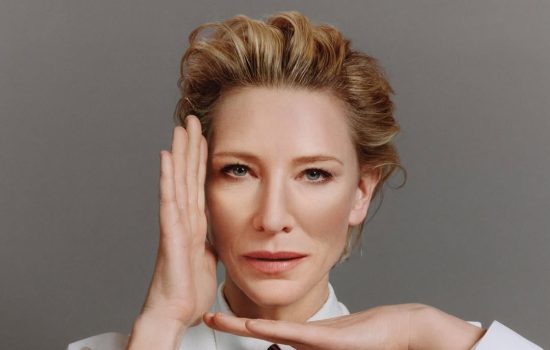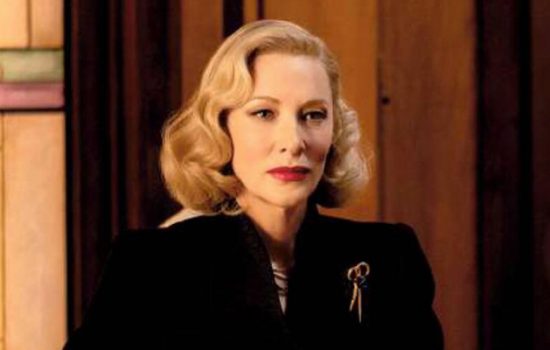Hello!
Madame Figaro has interviewed Cate Blanchett and Steven Stokey-Daley during LVMH Prize at the beginning of June 2022. The interview below is Google translated. You can check the scan for the original text.


“GOSH … IT’S LIKE AN OSCAR!” The young Englishman Steven Stokey-Daley hugs the golden trophy of the 9th edition of the LVMH Prize, rewarding a promising talent in fashion, an actress multi-Oscar winner, a sublime woman with a magnetic and benevolent gaze, has just presented it to him. On this improvised stage, Cate Blanchett does not play. The Australian-American star is really happy to see the emergence of this young generation of creators focused on beauty and ethics. This prize has already been a springboard for today’s world-renowned creators, such as Nensi Dojaka (winner of the previous edition), Jacquemus or Marine Serre. The endowment of 300,000 euros and mentoring within the LVMH group aim to help the winner develop and promote his brand. Like all the nominees, Steven Stokey-Daley is inhabited by the historical vocation of fashion designers: to make people dream. But also by the new role taken on by this prodigious industry: to be a vector of sustainable development. It is in this spirit that he has designed, under his label S.S.Daley, a collection that diverts the codes of the fan tassed wardrobe of English private schools, a universe opposed to his own since he comes from the working class of Liverpool. Recovered materials, vintage pieces…, he even transformed old napkins dedicated to tea service into patchwork shirts! The 26-year-old designer has already worked for Alexander McQueen and Tom Ford, and also dresses pop star Harry Styles, actress Emma Corrin and singer Dua Lipa. There’s punk in it, but soft, rounded, dotted with flowery patterns. His fashion thwarts identities and questions the unwritten rules of tradition. And we are delighted, on this British Jubilee Day, to launch this meeting between these two subjects of Her Majesty.
MADAME FIGARO: Steven Stokey-Daley, how do you feel?
STEVEN STOKEY-DALEY: The truth? I did not expect that! I’m still in shock, and so happy!
MF: Cate Blanchett, what did you think of the finalists and the winner?
CATE BLANCHETT: I am amazed by everyone, and I must say quite moved by the message and the story of Steven’s collection, which values British craftsmen. I am originally from Australia, I know the fragility of certain know-how lost forever. I think of those women who mastered old techniques of printing and dyeing fabrics… (She turns to him.) That you managed to show us that with your collection really touched me.
S.S.D: Did you notice? Thanks! In fact, I started working on this collection during the pandemic, in full confinement. Nothing entered the interior of the country, so I made it my mission to find the best local artisans, to highlight our heritage, those who work with silk, spinners and spinners of Scottish wool, weavers and Irish linen weavers…
MF: Do you think the pandemic has taught us anything or that we will go back to business as before?
S.S.D: This period inevitably changed our outlook and our way of working. Forced to look at what we had in us, inside, we notably rediscovered small local crafts.
CB: I think that the big brands are inspired by this emerging generation of designers who have in their DNA a responsible approach in terms of practice, image and relationships with others. Even in how they treat employees and customers, they drive change.
S.S.D.: My generation shares the same values, it’s almost second nature for us to be eco-responsible. But if I did upcycling, it’s also because I didn’t have the means to buy luxurious fabrics… By pushing me to play with materials that I had already used, sustainable development also allowed me to do my job!
MF: On this subject, you preach a convinced: Cate Blanchett you made the headlines for having walked the red carpet with dresses that you had already worn in the past…
CB: I love beautiful things, and when we have the privilege and the luxury of being able to wear a couture garment made expressly for you, it would not only be sad but inelegant and absurd to wear it only once! You’ll laugh, when I arrived in Cannes with a sumptuous dress, some journalists, looking a little embarrassed for me, slipped me quietly: “I think you’ve already worn it…” I replied: “Yes, I know!” Where I had thought of a form of celebration, they saw inattention…
S.S.D.: This is a way of educating and sensitizing the public: showing the world that a piece of clothing can live for more than the time of an evening, however chic it may be!
MF: Your professions, fashion and cinema shape the imagination and have often accompanied societal changes, sometimes announcing them: do you think this is still the case?
CB: The future is always shaped in the minds of artists. This is where the dream begins. We tell a story and we invite people to enter it whether it’s a film, a fashion collection, a choreography or a book… They enter an imaginary landscape without ideas preconceived, all possibilities open, offered. To come back more specifically to your question, in our respective sectors, even if we are not the worst polluters, we produce quite a lot of waste. We can do better and demonstrate that it is possible to reduce our carbon impact.
S.S.D.: Fashion is a form of theater that carries a message about society and can drive change. It shows how to be poetic, how to dream and be ambitious without doing any damage!
CB: Yes!
MF: Cate Blanchett, thanks to your profession, you have been able to wear clothes from all eras, even the clothes of Queen Elizabeth, which are not very practical…
CB: Everything can be reinterpreted today, Nicolas Ghesquière (artistic director of Louis Vuitton, editor’s note) did well with basket dresses in its fashion shows! I love inhabiting these silhouettes as much as their minds: it’s the great privilege to enter into the imagination of creators. For me, even if obviously the relationship with the director is essential, when I have to interpret a character, it is with the costume designer that I start the conversation, with them the character‘s psychology takes shape. Basically, there is a big difference between what we think we are, who we aspire to be and who we really are… Often, we dress either to hide ourselves or to reveal ourselves. Fashion understands this perfectly, it accompanies and facilitates our desires, our aims and our inspirations.
S.S.D.: Today, fashion no longer prescribes lines to follow all drawn, everyone can draw from a thousand different wardrobes without having to display who they are…
CB: Yes, I agree. People often ask me questions about identity, but – and it is. Maybe that’s why I’m an actress – my identity is so fluid! Obviously I am not an amoeba, I have a solid moral base and strong convictions, but my identity is fluid…
S.S.D.: I understand perfectly. I started doing theater as a teenager, in a national company. For a while, I even thought I was going to make it my career. It’s interesting what you say about building a character through clothing. Me, I first think of a character to define his look.
MF: So it’s not the habit that makes the monk…
S.S.D.: No, it is the monk who makes the habit, the character defines the clothes. For a collection, I create my little universe with six or seven characters…
CB: Oh, it’s exciting!
S.S.D.: Thank you… I’m writing their whole story, their background… It’s a lot of work, too much writing! But all this information defines the garment, the cut, the material, the details, what the person can do with it and in what situation…
MF: Artists, by definition, you live from the desire of the other: is this need for public recognition a brake or a driving force?
CB: Paying attention to how you are going to be greeted before you even start work is putting the cart before the horse, a dangerous way to work. You can’t think about what’s going to happen first. I imagine it’s the same for a collection, you just have to move forward, one step after another.
S.S.D.: Absolutely. I forbid myself to think about the outcome, or how the result of my work will be perceived. Otherwise, I couldn’t move forward…
CB: We wouldn’t get up in the morning… But it takes courage. I, for example, am full of fears and doubts. But at the end of the day, we get up and do what we have to do. When the film comes out, I go back under the duvet thinking: “Anyway, no one is going to see it”…and that’s often the case! (Laughs.) The idea of ??doing everything for people to like, it’s so unpleasant, precisely. And at the same time, it‘s so brutal to be on display, to do a job that lives off the public.
MF: Do prizes help you move forward?
CB: I experienced something very strange this year, and very unexpected: I received three important awards. You have to understand that as an Australian, I would never have imagined being recognized and rewarded outside of my culture. I still can’t believe it, it’s very intimidating for me and I imagine you, Steven, must feel the same way when this international group that is LVMH gives you a prize…. At the same time, the prizes are gratifying, but it is the failures that allow us to learn. The path to success—whatever that word means—is a bumpy road. I know, it sounds a bit like advice from a mother, but it‘s so true: you do not learn much by winning a prize, you should not lock yourself into it.
MF: Cate Blanchett, based on your experience, would you have any advice to give him?
CB: Oh no! Advice is unbearable. Ask my children, I’m constantly on their backs.
MF: So, any question you would like to ask him?
CB: Two. What music inspires you? And where do you see yourself in five years?
S.S.D.: Kate Bush! I’m obsessed with her, I listened to her a lot during the preparation of this collection. And in five years… Gosh… I don’t know. I hope to be happy and in agreement with my choices.
CB: Who would you like to collaborate with? No, do not answer, call me next week! (Laughs.)





 A Manual for Cleaning Women (202?)
A Manual for Cleaning Women (202?) Father Mother Brother Sister (2025)
Father Mother Brother Sister (2025)  Black Bag (2025)
Black Bag (2025)  The Seagull (2025)
The Seagull (2025) Bozo Over Roses (2025)
Bozo Over Roses (2025) Disclaimer (2024)
Disclaimer (2024)  Rumours (2024)
Rumours (2024)  Borderlands (2024)
Borderlands (2024)  The New Boy (2023)
The New Boy (2023) 











